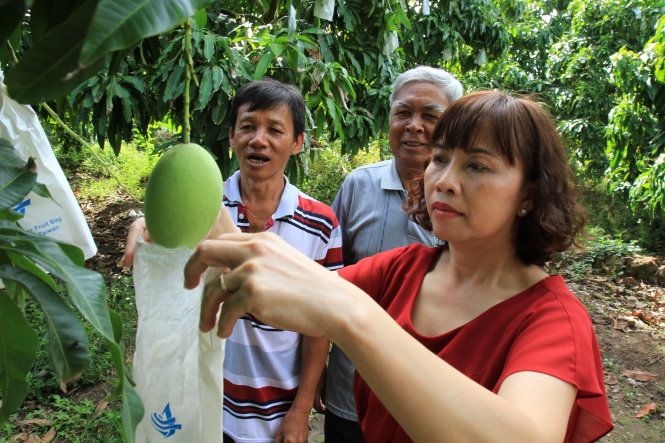Urban dwellers both in and outside of Vietnam can now own productive mango trees with a couple of clicks of their mouse, and never have to worry about not having the space.
“Cay Xoai Nha Toi” (My Family’s Mango Tree), is an online program offering mango trees for sale that began this month as an initiative of the My Xuong Cooperative in Cao Lanh District, in the southern province of Dong Thap.
The cooperative said on its website that upon purchase, customers own selected trees for a particular period of time, and the plants are grown and taken care of by growers at the plantation.
‘Owners’ are able to visit the garden where their chosen trees are grown, and with guidance from local growers, harvest the fruit as they wish.
“Many city residents have already enjoyed owning, taking care of and harvesting their trees,” Vo Viet Hung, director of the cooperative, told Tuoi Tre (Youth) newspaper.
He said that the program had attracted lots of attention from the market, adding that the cooperative planting procedure followed VietGAP (Good Agricultural Practices) standards.
“Within just over a week of operation, 30 customers have reserved more than 50 trees from our website,” he said.
The ‘owner’ experience
Nguyen Thi Hong Ngoc, from Tan Phu District, in Ho Chi Minh City, said that she had little space to plant vegetables or fruit trees.
So, through the program, Ngoc has made her home-farming dream come true by buying two mango trees for VND11 million (US$493).
“The website displays images and detailed profiles of the trees including prices, so you can choose the trees you like,” she said.
Passionate about taking care of ‘her’ trees, Ngoc paid a visit to the garden of Do Van Em on Sunday, where both of her mango trees are planted.
On meeting her plants, Ngoc was surprised to hear that each would bear more than 200 ripe mangos.
During her visit, Ngoc was taught how to grow and take care of her mango trees, in particular the process of covering the fruits in bags to prevent infestation from pests.
Nguyen Van Phu, another customer in Ho Chi Minh City, said that his friends in Hanoi had bought approximately 10 mango trees, which were spread out over 2,200 square kilometers.
“They are delighted to own mango trees so far to the south,” Phu said, adding that the cooperative sends his friends photos every week to provide regular updates on the health of their trees.
Mutual benefit
Despite being a new concept, the model has proved beneficial to both the customer and provider.
“I never knew until now that planting mango trees following VietGAP standards meant covering the fruit in bags instead of using pesticides,” Ngoc said when talking about the programs adherence to food safety measures.
“I grow this fruit myself, so I don’t have to worry about their safety,” she added.
“I will harvest the mangos and give them to my relatives and friends as gifts.
“Although they don’t cost a lot, these mangos will be adored for their quality,” Ngoc said.
Hung said that the main goal of the program was to get consumers to understand the process of planting and harvesting fruit, and in doing so build trust among growers, traders, and consumers themselves.
Although mangos from Cao Lanh District are exported to lots of countries, Hung told Tuoi Tre that there are 9,000 hectares of mango trees in Dong Thap, meaning a huge amount of fruit was not consumed.
“Those whose fruit is left unsold lose out. Therefore, by selling the whole tree, mango growers can earn a sustainable profit year-round, reducing lost income,” he said.
“I was very happy when three trees of mine were sold, it meant I didn’t have to worry about losing money on this crop or the one after,” Em said.
Le Minh Hoan, Secretary of the Dong Thap Party Committee, said that the model connects growers directly to consumers, creating a bond between them, and introduces the specialty to new markets in and outside of Vietnam.
Like us on Facebook or follow us on Twitter to get the latest news about Vietnam!




















































